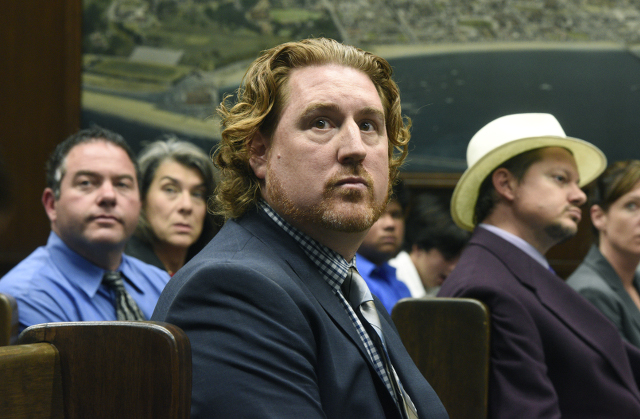
It was, as Mayor Helene Schneider put it, “an intense but important discussion” that dominated this Tuesday’s City Council meeting when a medical marijuana dispensary destined for lower Milpas Street barely survived being smothered in its crib by throngs of critics and three of Santa Barbara’s councilmembers. Given the public backlash, mainly from Eastside Latino families and church members, Schneider advised dispensary operator and Los Angeles transplant Ryan Howe to make community relations his top priority. “Not being seen as an ‘other’ is imperative,” she said.
More than one member of the council also remarked on the full-circle sensation generated by the hearing, as City Hall for the last decade has navigated — and at times stumbled — through the murky waters of medical marijuana laws. Howe’s club, to be called Canopy, will be one of the first to open in more than four years after Santa Barbara’s once flourishing storefront landscape withered under a series of federal crackdowns in the spring of 2012. Another new, fully permitted collective is set to open on upper State Street in coming months.
Tuesday marked the second appeal of Canopy after the Planning Commission upheld its prior approval last month. Led by neighbor Pete Dal Bello, whose family owns a home and two businesses near the 118 North Milpas Street storefront, the opposition voiced oft-heard refrains around medical marijuana dispensaries — that they eat up precious on-street parking, attract criminals to the neighborhood, and tempt curious kids passing by. Father Pedro Lopez of nearby Our Lady of Guadalupe Church told the council he works hard to keep his congregation safe from corruption and crime. “This facility would compromise that greatly,” he stated.
“History speaks volumes,” said Martha Jimez, referring to five former dispensaries targeted by robbers. “Please don’t let us live through this again. … Do what’s right,” she implored with the opposition’s slogan, “find another site.” Other speakers cited an Eastside neighborhood petition with nearly 200 signatures that demanded the dispensary be moved to another part of the city, like the West Pueblo Street medical center near Cottage Hospital. Pointing to Casa Esperanza, MarBorg, and El Estero, they said the Eastside has too long been the dumping ground for the city’s more smelly and dangerous features.
Anna Rico said she was worried for her son, who passes the Milpas location every day to and from school, and for her Spanish-speaking neighbors, who have little understanding of how a medical marijuana collective operates. They see the club as nothing more than the purveyor of an illegal drug, she said. Abbey Fragosa lived next to the Humanity dispensary on Bond Avenue from 2006-2010. She took issue with claims that dispensaries don’t generate crime, explaining she was the victim of many “negative and frightening” confrontations with Humanity patients. “No amount of scientific studies can represent the fear I experienced,” she said.

In contrast, members of a newly formed pro-dispensary group calling themselves SB 28.80 — for the 2010 municipal code that allows for three clubs in designated zones within city limits — played a video for the council that reflected very different sentiments. It ran through the history of Santa Barbara pot laws and featured interviews with doctors, lawyers, and politicians who spoke about the efficacy of medical marijuana and evolving public opinion around the drug. Danielle Winkler, SB 28.80’s outreach director, said the group had been in contact with more than 1,000 city residents in favor of storefront operations.
Howe assured the council he’s starting the nonprofit for all the right reasons. “I’m here to run a proper business, just as I’ve been doing for the last 22 years,” he said. Howe, former president of Thunder Bay Pictures production company, said he moved to Santa Barbara two years ago to start a family: “This is my community, too, even though I’m new, and I care very much about it.” Howe explained that Canopy will be made into a holistic wellness center complete with small yoga classes and regular educational seminars. “Yes, one of the products is marijuana,” he said, but “we’re not just building a pot shop like Santa Barbara has seen in the past.”
Howe dismissed attacks on his character and business record in the form of anonymous letters sent to City Hall in recent weeks. He claimed the letters, which allege Howe was soliciting investors for a “for-profit” venture, only arrived after he refused to work with former dispensary owners. Joe Allen — both Howe’s attorney and a longtime advocate for the South Coast medical marijuana scene who operates the upper State Street club — sought to dispel rumors that Howe and his landlords are somehow in cahoots. He said Howe isn’t a partner in Merry Milpas LLC, a real estate investment company that leased Howe the building, and that none of the LLC’s partners are members of his collective. Merry Milpas managing partner Steven Bernston testified to the same facts. “It’s a totally separate relationship,” he said.
Allen told the council how Canopy met the other day with nearby business owners anxious about on-street parking, given the collective won’t provide any on-site spots. They were represented Tuesday by Jarrett Gorin of Vanguard Planning, who had filed his own separate appeal. Howe agreed to limit patient visits to 150 a day — at which point the dispensary would close until the next morning — and provide his employees identifying stickers for their cars to ensure they don’t park along residential streets. The council, like the Planning Commission, approved Howe’s overall operation plans and security protocols. They acknowledged, however, that Santa Barbara’s current checklist of requirements may need reexamining after California voters decide in November whether to legalize recreational marijuana use. City Attorney Ariel Calonne said he’ll brief the council on contingency plans in two weeks.
The vote was 4-3 to deny the two appeals. Dissenting Councilmember Bendy White said he couldn’t support Canopy for the simple reason it would impinge too heavily on parking. Randy Rowse said he was swayed against the dispensary after watching crowds of students funnel by it this Monday. He called the location unfair and inappropriate, proclaiming, “Milpas got dumped on once again.” Jason Dominguez, who represents that area of the city, echoed similar thoughts. “We as a council have to do better” for the Eastside, he said. He wondered why State Street and the Mesa weren’t considered suitable sites for dispensaries. “We can’t just hide behind the law,” he said of the 2010 ordinance. “We are the law.”
Councilmember Frank Hotchkiss wasn’t shy about swatting away the danger-to-kids argument. “It doesn’t make any sense to me that someone walking by a front door will be infected by what’s inside,” he said. “This is a silly, silly way of looking at things.” Cathy Murillo, who voted with Schneider and Gregg Hart to save Canopy, warned Howe that the city would be closely monitoring his business and its books. If he fails to abide by the conditions of his permit and run an above-board collective, she said, the city will yank his license in a hurry. “I promise you, Mr. Howe, we will be watching,” she said.



